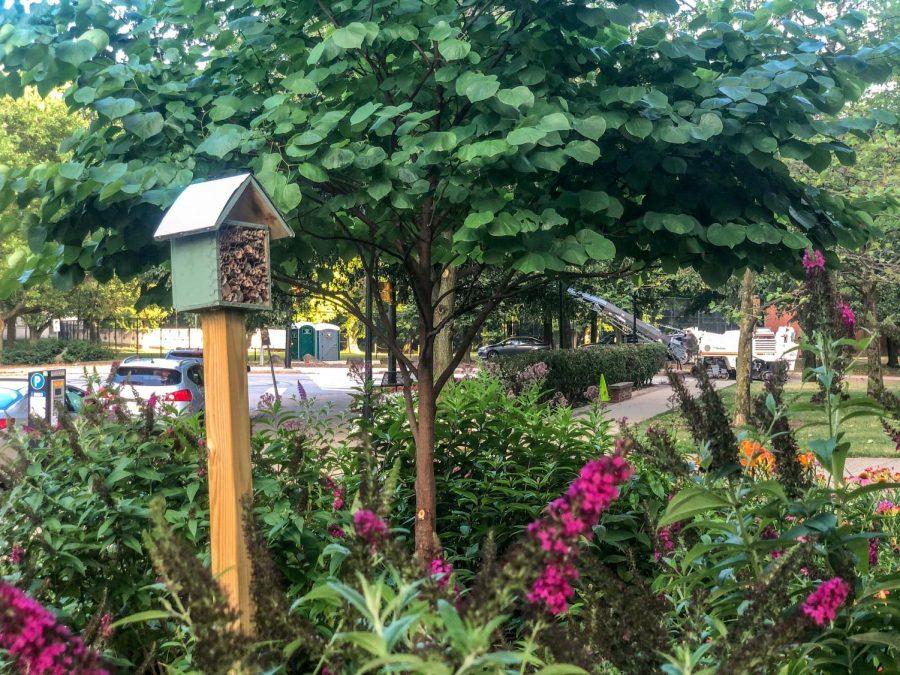Pitt students a-buzz for pollinator preservation
Leah Mensch | Contributing Editor
Sarah Hart, a senior environmental studies major, built seven bee houses for solitary bees last spring for a sustainability class.
July 14, 2020
Pitt students will have another reason to wear masks on campus this year — pollen.
Pitt earned certification as a Bee Campus USA affiliate last month, the fifth campus in Pennsylvania to earn this recognition. The certification commits the University to environmental preservation efforts, such as planting more native plants and designing pollinator-friendly green spaces on campus.
Created by the Xerces Society for Invertebrate Conservation, a nonprofit focused on protecting invertebrates such as solitary bees, butterflies and moths, Bee Campus USA enlists institutions of higher learning nationwide to raise awareness about the importance of pollinators and habitats for pollination.
Senior environmental studies major Sarah Hart built seven bee houses in green spaces around Oakland last spring for solitary bees as part of a project for a sustainability course she was taking. Little did Hart know, her initiative would contribute to a larger dialogue regarding habitats for pollinators on Pitt’s campus.
“I believe that this actual recognition will make Pitt feel like they should do more for pollinator species,” Hart said. “Maybe students will become more interested in finding out what solitary bees are through different activities that we may do. I just feel like there will be more projects that come out of it.”
Hart not only assisted the application process to obtain the certification, but is also a member of one of the biggest additions to Pitt’s sustainability plans to come out of the Bee Campus initiative, the Pollinator Habitat Advisory Committee.
Andy Moran, a senior grounds manager, is the committee chair. He said the committee’s goals are to guide the University’s landscape designs with a Campus Pollinator Habitat Plan and to work on annual Bee Campus USA applications.
Aurora Sharrard, Pitt’s sustainability director and a committee member — said Pitt’s bee-friendly status will urge the University to support pollinator gardens on campus in addition to its sustainable landscape design guidelines, which will act as a manual to ensure Pitt is creating pollinator friendly spaces on campus and planting native species.
“Pollinators are threatened for a variety of reasons, and the University has long been trying to support them through its landscape practices,” Sharrard said.
Sharrard said the committee will focus during the upcoming academic year on creating efficient education and outreach programs for the Pitt community.
“Through linking our existing sustainable landscape guidelines, working with faculty who are experts in pollinators and just trying to figure out how we can expand our physical amenities for pollinators on campus,” Sharrard said, “we can start to really push out into the education space for pollinator information on campus.”
As of now, there are no direct actions outlined in Pitt’s Sustainability Plan to create more pollinator-friendly habitats. According to Sharrard, this is something that can change, given Pitt’s new status as a bee campus.
“Hopefully this just emphasizes to the University community everything that we’ve been doing for pollinators and better lays out a path for everything that we are committed to doing in the future,” Sharrard said.
But she said the University will work on improving the quality of open space around campus through the Campus Master Plan.
“These endeavors include increasing tree cover, reducing lawn, adding more native and adapted plants and managing stormwater,” Sharrard said. “All of these efforts complement our Bee Campus USA efforts and designation.”
Ultimately, Sharrard said, an ideal version of campus includes a variety of native plants in the area and a habitat for pollinators that is in line with sustainable landscaping.
“Pollinators need things to pollinate. As an urban campus, we have a responsibility to make sure that network is there for them,” Sharrard said. “That’s what we’re doing as we create more space and plant more native plants on campus.”
According to Moran, Pitt has developed an integrated pest management program in order to seek alternative solutions to pesticide use by employing products that are organic and pose the least risk to pollinators. But he said it is nearly impossible to completely avoid pesticide use.
“Grounds does work maintaining the outdoor appearance of the campus,” Moran said. “We try to do our integrated pest management program as much as possible. We don’t spray pesticides when they are not needed, and we don’t spray neonicotinoids, which are threatening the bees.”
Along with the use of more eco-friendly products to create pollinator-friendly spaces on campus, Hart said she hopes Pitt’s new certification will ultimately lead the University toward a more environmentally conscious future.
“Campus is big and we feel very small in it, so being able to bring a project to life that they are passionate about can boost efforts that Pitt was unable to do on their own,” Hart said. “It keeps Pitt responsible for not only saying that we are a green campus, but having their actions reflect how they are impacting the environment and ultimately the bees.”
Editor’s note: Sarah Cutshall, a senior staff photographer at The Pitt News, is a member of the Pollinator Habitat Advisory Committee.



